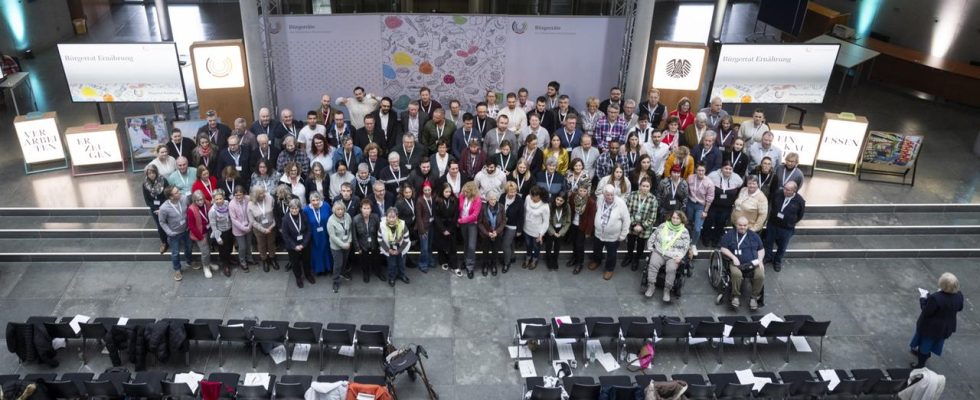faq
The traffic light coalition has decided to have citizens’ councils appointed by the Bundestag. The first on nutrition made recommendations in February. What’s next?
In February, the Bundestag’s first Citizens’ Assembly on the subject of nutrition handed over nine recommendations to Bundestag President Bärbel Bas. This includes free lunch for children in daycare centers and schools. Today the Bundestag is debating the recommendations for the first time. But will the MPs actually implement them? And how does the whole thing work? An overview.
What is the Citizens’ Assembly “Nutrition in Transition”?
Citizens’ councils are a form of political participation that can complement parliamentary work. But you cannot make political decisions. The traffic light parties have stipulated in their coalition agreement that they want to have citizens’ councils set up and organized by the Bundestag.
This has now happened for the first time with the Citizens’ Assembly “Nutrition in Transition”. The Bundestag set up this citizens’ assembly last spring. 160 citizens were randomly drawn as members. Care was taken to ensure that the group was representative of the German population.
The topic was also determined by the Bundestag. The central question for the Citizens’ Assembly: What and how much should the state regulate in the area of nutrition? The members discussed this in several face-to-face and online meetings from autumn 2023 and also listened to experts.
In February, the Citizens’ Assembly handed over its recommendations to Bundestag President Bas and the parliamentary groups in the Bundestag.
What recommendations does the Citizens’ Assembly make?
The Citizens’ Assembly made a total of nine recommendations. The most important thing: There should be a free, healthy lunch for all children in daycare centers and schools. It should be introduced gradually, starting with daycare centers. In order to finance this, the citizens’ assembly members suggest foregoing an increase in child benefit.
Further recommendations include a mandatory state label for food that takes into account the areas of climate, animal welfare and health, an animal welfare tax and an age limit for energy drinks.
What happens now with the recommendations?
The traffic light has stipulated in its coalition agreement that the Bundestag will deal with the recommendations of the citizens’ councils it has appointed. There is a Bundestag debate on this today. This is a first – there had already been citizens’ assemblies before, but no separate debates about this in the Bundestag.
The recommendations are then referred to the relevant committees. The Committee on Food and Agriculture is in charge.
When calling for free lunch, the states must also be included, for example, because they are responsible for daycare centers and schools.
Whether individual recommendations actually come to a vote in the Bundestag depends on whether the parliamentary groups submit corresponding draft laws.
Are the recommendations implemented?
The Citizens’ Assembly’s recommendations are not binding for the Bundestag, so it does not have to implement them. However, Bundestag President Bärbel Bas has repeatedly emphasized that the Bundestag will deal with this seriously. This is important so that the participants are not frustrated if their work simply disappears in a drawer, said the SPD politician.
Marianne Schieder, chairwoman of the Citizens’ Council rapporteur group in the Bundestag, also said that the committee would ensure that the plenary session and the committees dealt intensively with the recommendations. But these vary in complexity, said the SPD politician.
She could imagine a quick implementation, for example, by introducing an age limit of 16 years for energy drinks. However, demands such as free lunch become more complicated, as the states and various departments have to be involved.
The chairman of the Committee for Food and Agriculture, CDU politician Hermann Färber, said that he sees the Citizens’ Council’s recommendations as opportunities to move forward in deadlocked debates, for example on animal welfare.
The Bundestag is now at the beginning of a detailed discussion about the citizens’ suggestions. It will probably be a few months before it becomes clear what he ultimately makes of it.
Lea Kiehlneker, ARD Berlin, tagesschau, March 14, 2024 5:32 a.m

